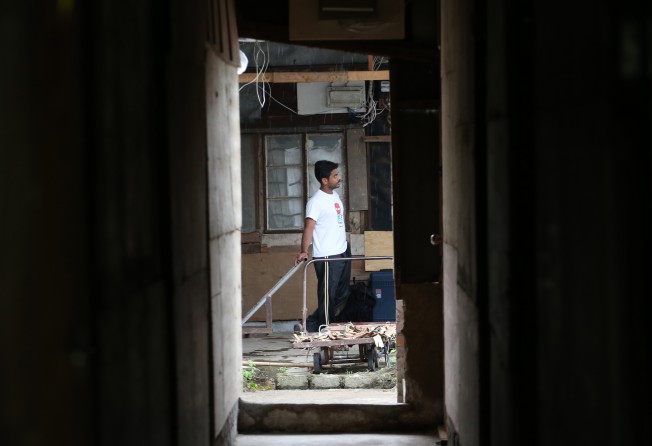Hong Kong's bogus asylum claim industry exposed: The black-market labour racket and the middlemen making millions

A black-market labour racket which uses bogus asylum claims as cover for a growing army of illegal workers to fill chronic labour shortages in key sectors of the Hong Kong economy is costing the city's taxpayers millions.
A Sunday Morning Post investigation can reveal that the trans-national scam - which in many countries is criminalised under extensive human trafficking laws - not only allows thousands of foreign nationals to work illegally in the city, but is also lining the pockets of middleman agencies overseas and a number of local law firms.
An organised racket in so-called "asylum visas'' touted by middleman agencies in India and executed by law firms with expertise in refugee, asylum and torture applications, exploits shortcomings and delays in system allowing people to stay in the city but work illegally.
Immigration chiefs are so concerned about the situation they are expected to go to India soon to meet with their counterparts there over the issue.
The news comes as the Hong Kong government faces a landmark legal challenge centred around a claim by a Pakistani man that the city's laws do not sufficiently protect victims of human trafficking, in breach of Hong Kong's Bill of Rights, which says no one shall be held in slavery or servitude.
Diplomatic sources and legal insiders have confirmed that significant numbers of Indian nationals who have sought sanctuary in Hong Kong were making bogus claims.
"No one in India is tortured nor treated cruelly out of political or religious reasons. Such claims are therefore without basis," a diplomatic source said. "We do not rule out the possibility of human trafficking and syndicates being behind this."
The Immigration Department said the Consulate General of India offered a visit to the country to collect more information. "Hopefully we will visit Punjab and West Bengal next month - the two biggest states where the claimants are from," said William Fung Pak-ho, assistant director of the department's Enforcement and Torture Claim Assessment.
Unlike visa restrictions to Vietnamese, Pakistani or Bangladeshi nationals, Indians can stay in Hong Kong up to 14 days visa free. The relaxed entry permit made them the largest ethnic group that makes up 20 per cent of more than 10,600 unsettled non-refoulement applications in Hong Kong. Non-refoulement is the term used in international law to describe the right of someone facing persecution in their home country not to be sent back.
Employment agencies allegedly offering one-stop services and conspiring with Hong Kong law firms to solicit Indian Nationals to lodge claims in the city. The fact that a claim can take years to process, opens a window for black market employment.
Some of them were told they could work in the city under "asylum visa".
One bogus asylum seeker, who has been working in Hong Kong illegally for two years, told the Post that an Indian business group in Hong Kong offered dozens of jobs to refugees.
"Many of us work in the kitchens or as dish-washers at one of his restaurants," he said. "We earn around HK$6000-8000 a month. They pay us cash to avoid records and responsibilities."
The manpower shortage has raised concerns about a "black market" for labour importation. The Labour Bureau predicted the city would need another 118,000 workers to meet demand in 2022. The construction sector and food services are estimated to have a further 44,800 and 27,000 vacancies in seven years respectively.
The Immigration Department said the number of torture claimants arrested for unlawful employment surged from 36 in 2009 to 197 in the first ten months of this year.
"Most of them are economic refugees seeking jobs. They used to work as dishwashers in urban areas," Fung said. "Now many of them have moved to recycle yards in the New Territories to scrap vehicles."
Fung said the department and the police were conducting in-depth investigations into unlawful employment and smuggling activities.
Fung hoped to receive assistance from the Chinese embassy in India and law enforcement agencies to dig out more information on agencies operating in Hong Kong.
"It is difficult to gather information as it involved cross-border crime and different legal systems," Fung said.
Tony Read - a justice advocate with the Vince Community Services Centre, which has been working with refugees and asylum seekers for a decade - said such cases were an abuse of the Unified Screening Mechanism and could affect how the government and society perceived real refugees.
"This is giving refugees a bad name," he said, and that the cases have overwhelmed the real problem of refugees, which should be treated separately.
Jeffrey Andrews, social worker with Christian Action, said the problem delayed real seekers from getting protection.
"Thousands of refugees from Africa and Middle East have been waiting here for years to be resettled. Their applications have been delayed by those bogus claims," he said.
United Nations High Commissioner assisted 25,865 Indian refugees in 2014, with 5,074 of those cases in progress. The European Union has settled 7,100 Indian asylum seekers between 2010 and 2014.